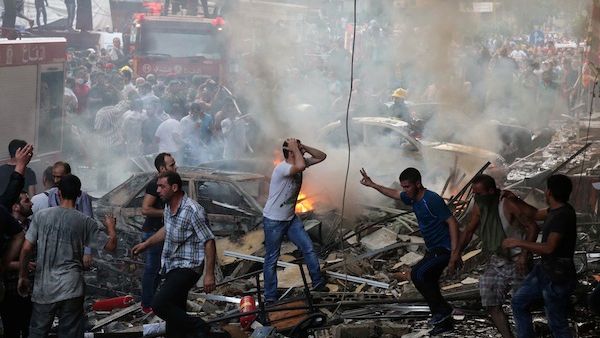Former Lebanese Prime Minister Saad Hariri reiterated Saturday his condemnation of a car bombing that targeted Beirut’s southern suburbs this week but blasted Hezbollah leader Sayyed Hasan Nasrallah saying his recent speech threatened to further involve Lebanon in the Syria war.
“What happened in Ruwaiss is an ugly crime, but Hezbollah's war in Syria is a crime as well,” Hariri posted on his twitter account.
An explosion rocked the Ruwaiss area in the Beirut southern suburbs Thursday, killing over two dozen people and wounding hundreds.
In a speech Friday, Hezbollah Secretary-General Sayyed Hasan Nasrallah called on the residents of the suburbs to exercise self restraint, accusing takfiri groups of standing behind the explosion and an earlier blast that hit the southern suburbs in July.
Nasrallah said he was ready to personally fight in Syria if the battle with takfiris required so.
“I listened to speech by Hezbollah secretary general. It was rather balanced at first, and catastrophic toward the end,” Hariri said.
“How can a responsible man contradict himself so, calling for self-restraint and announcing his readiness to personally go to Syria?” the leader of the Future Movement asked.
Hariri said that Hezbollah was defining terrorism based on its own interests.
“It is good the Secretary General of Hezbollah is enthusiastic to combat terrorism, but we still don't understand why he drew a red line in Nahr al-Bared. Wasn’t it takfiri weapons fighting the army then?,” Hariri asked, referring to the deadly 2007 battles between the military and the Islamist Fatah al-Islam group in the Palestinian refugee camp of Nahr al-Bared of north Lebanon.
“Terrorism is the same regardless of the faces it takes, but Hezbollah explains it according to its own interests,” he said.
Hariri said that Hezbollah had to consult all the Lebanese before deciding to combat takfiris in Syria, rather than start its own war in Lebanon’s neighbor, which he said aimed at defending the regime of Syrian President Bashar Assad.
Hezbollah announced its heavy involvement in Syria’s war in May, saying its decision aimed at defending the resistance and Lebanon against takfiri groups.
Takfiri groups consider people who do not share them their religious views as infidels.
“Hezbollah’s logic reminds me of American logic for invading Iraq under the pretext of WMD's,” Hariri tweeted, referring to the U.S.-led invasion of Iraq in 2003.
“The same will happen in Syria and the takfiris will prove to be a tiny minority which will have no place in Syria after Bashar's fall,” he said.
“Takfiris have no place in Syria after the fall of Bashar. But what will Hezbollah do after Bashar falls?,” Hariri asked.
“Logically it will withdraw from Syria but what will it do in Lebanon? America withdrew from Iraq to America where Iraq is not a neighbor.”
“He [Nasrallah] is laying the foundations for a tense neighborhood with the new Syria,” Hariri said.
The former prime minister added that the Lebanese state could protect the country.
“Whenever there is a common collective decision we can really protect Lebanon. The State is the common ground for all,” he said.
“The army represents the entire people, from all categories, sects and regions. The people resist through their army.”
“And resistance is no longer when it becomes an entity above State, army and people,” Hariri added.
He said that Nasrallah’s speech did not contribute to defusing tension in Lebanon, voicing regret that it rather further involved Lebanon in Syria’s violence.
“Sedition is the essence of terrorism, and the most dangerous kind. Once again, Sayyed Hasan's speech did not break the cycle of escalation,” he said.
“Sayyed's speech takes Lebanon to further involvement in the Syrian fire. It is a pity to squander the blood of the Lebanese in such a way.”









